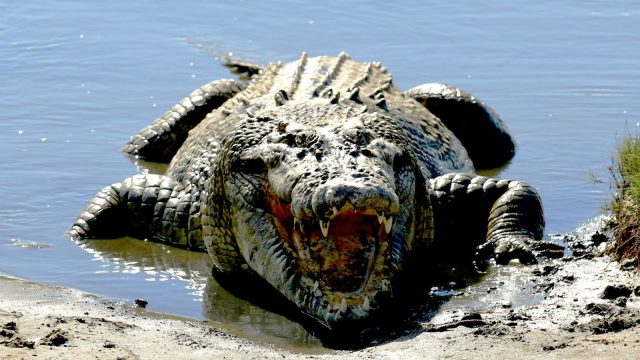A crocodile who is believed to have fatally attacked a man while he was on holiday with his wife and children has been killed.
The 40-year-old, from New South Wales, was the second person in just over a month to die of a crocodile attack in Australia.
He had been fishing on Saturday while on holiday with his wife and children, travelling through Queensland with a trailer, police said.
Government conservation officer Daniel Guymer said the man fell into the Annan River south of Cooktown.
His body has not been recovered.
Read more on Sky News:
Sharks off Brazil coast test positive for cocaine
Crocodile that lunged at children is cooked for locals
Cooktown resident Bart Harrison said the steep bank had collapsed underneath the victim’s feet, sending him more than 20ft into the river which is renowned as a crocodile habitat.
“It’s straight up and down. It’s a hairy spot to be fishing,” Mr Harrison said.
“We grew up watching the crocs swim around there and I wouldn’t go near that edge. There’re always one or two big crocodiles living there.”
Mr Guymer said the suspected crocodile, which had a scar on its snout, was found in a creek 2.5 miles away from the scene of the accident. Witnesses saw crocodiles in the area, known by locals as Crocodile Bend.
The crocodile was “humanely euthanised” by wildlife officers, Mr Guymer said.
It comes after a 12-year-old girl was snatched on 2 July while swimming with family in a creek in the neighbouring Northern Territory.
Her remains were found days later and wildlife rangers shot dead her 14ft killer.
There have now been a total of three fatal crocodile attacks in Australia this year, close to the worst annual death toll on record of four in 2014.
A 16-year-old boy was killed while swimming off a Queensland island on 18 April.
Government authorities are investigating a social media video that appears to show a crocodile being fed in the same river where the latest incident occurred.
Mr Guymer warned that feeding dangerous wildlife in Queensland was an offence punishable by a fine of almost 6,500 Australian dollars (around £3,300).
“It is, of course, a very, very concerning behaviour. It’s very risky and it’s very reckless,” he said.


















